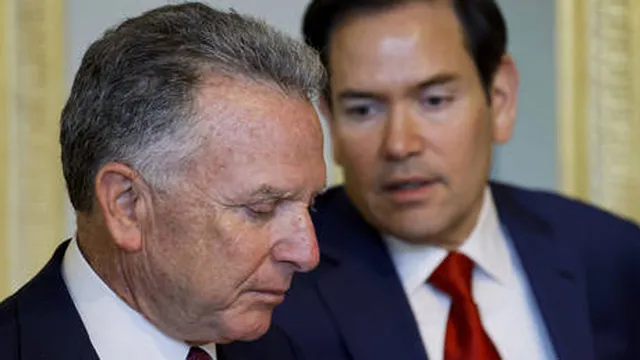
Witkoff heads to Russia while US officials skip London talks
2025-04-23 09:14- US Secretary of State Marco Rubio and special envoy Steve Witkoff will not attend the Ukraine talks in London due to scheduling conflicts.
- General Keith Kellogg will represent the US at the discussions, which include officials from the UK, France, and Germany advocating support for Ukraine.
- The US remains committed to ongoing negotiations, with Witkoff scheduled to meet with President Putin in Russia later this week.
Express your sentiment!
Insights
On April 23, 2025, US Secretary of State Marco Rubio and US special envoy Steve Witkoff withdrew from participating in discussions regarding Ukraine, scheduled to take place in London. This decision was confirmed by the State Department, which cited scheduling conflicts for Rubio's absence. General Keith Kellogg will represent the US instead at the talks, which will include UK, French, and German officials advocating for ongoing military support for Ukraine. These meetings follow prior high-level discussions in Paris, which included Rubio and Witkoff meeting with European and Ukrainian officials. The discussions centered around a proposed US peace framework, which has not been publicly disclosed and reportedly includes recognizing Crimea as Russian territory and potentially lifting sanctions against Moscow. Concurrently, Witkoff's upcoming visit to Moscow to meet with President Vladimir Putin indicates ongoing negotiations, emphasizing that the current situation necessitates continuing dialogue between the two nations despite the missed talks in London. News surrounding the Ukrainian conflict reveals the delicate balance of diplomacy as both the United States and Russia approach the issue. The talks in London have been organized with the imperative of solidifying support for Ukraine among allied nations amid the ongoing conflict. Despite the withdrawal of key US officials, the Pentagon and State Department have assured that the US commitment to Ukraine remains strong, a sentiment echoed by General Kellogg's continued presence at the London talks. In parallel, Witkoff's scheduled meeting with Putin signifies the Trump administration’s commitment to fostering relations with Russia and maintaining lines of communication open, despite the complexities introduced by NATO's policies and regional escalations in Eastern Europe. The intricacies of the present diplomatic standoff are evident, with Russian officials asserting that they will not negotiate on the status of Crimea or other territories annexed since 2014, underscoring their firm stance regarding territorial integrity. The insistence on acknowledging 'reality on the ground' as a precondition for peace talks emphasizes the ongoing tensions and highlights the complex web of geopolitical interactions at play in shaping the future landscape of US-Russian relations amid the Ukrainian crisis. This ongoing saga not only affects the involved parties but creates ripples of uncertainty across the international community, calling for keen awareness as stakeholders navigate this precarious situation in hopes of securing regional stability. Amid all these developments, public responses from both nations remain mixed, with many questioning the implications of US actions on Ukrainian sovereignty and regional security. The urgency for concrete results from the negotiations reflects the reality that the stakes involved are substantial, influencing not only peace processes but also the diplomatic fabric between NATO allies and Russia moving forward.
Contexts
The impact of U.S. foreign policy on NATO and Russia relations has been a focal point of international relations since the end of the Cold War. The U.S. has played a pivotal role in shaping NATO’s strategies and its collective defense framework, particularly following Russia's annexation of Crimea in 2014 and the ongoing conflict in Ukraine. Under the auspices of American leadership, NATO has engaged in a series of military reinforcements in Eastern Europe, aimed at deterring Russian aggression. The principle of collective defense enshrined in Article 5 of the NATO treaty has been invoked to reassure member states of their security commitments, raising tensions with Russia, which perceives these actions as a direct threat to its sphere of influence. The U.S. foreign policy, emphasizing a strong transatlantic alliance, has resulted in extensive military exercises and the establishment of multinational battalions in countries bordering Russia, which aggravates the already precarious relations between NATO and Moscow. Moreover, U.S. diplomacy has often pursued a dual approach in dealing with NATO and Russia, oscillating between deterrence and dialogue. High-profile summits, like those between U.S. Presidents and Russian leaders, attempt to stabilize relations and manage crisis moments, albeit with limited success due to mutual distrust. Policies such as sanctions imposed on Russia for its actions in Ukraine and cyber interference have further alienated Moscow, while NATO’s continuous expansion—adding Eastern European nations to its ranks—has been deemed a provocative move by Russian leadership. This interaction highlights a core challenge in U.S. foreign policy: balancing the defense commitments to NATO allies while handling the complex and often adversarial relationship with Russia. The geopolitical landscape has transformed, leading to an increasingly multipolar world where U.S.-China relations also affect NATO's dynamics. The recent rise of China as a global superpower has compelled NATO to consider new strategies that address not just the threat from Russia but also the implications of a rising China. The 2021 NATO Strategic Concept reflects this shift, emphasizing the need to counter systemic challenges posed by authoritarian states. As a result, U.S. foreign policy must adapt, reinforcing NATO’s unity while addressing the broader strategic challenges requiring a cohesive response from transatlantic partners. In conclusion, U.S. foreign policy has significantly influenced NATO's posture and its contentious relationship with Russia. The interplay between military readiness, diplomatic engagement, and strategic deterrence forms the backbone of NATO's response to Russian actions and the evolving security environment. As challenges persist, including hybrid warfare and disinformation campaigns, the U.S. must navigate these complexities with an effective strategy that prioritizes collective security while managing the intricacies of U.S.-Russia relations, creating a path towards peace and stability in a multipolar world.